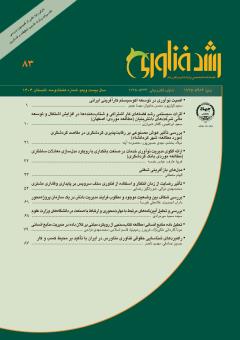تبیین جایگاه و نقش تسهیل گران زیستبوم کسب و کارهای نوآور (فضای کار اشتراکی و شتابدهندهها) در توسعه شهری دانشبنیان و شکلگیری کریدور علم و فناوری اصفهان
محورهای موضوعی : Science and Technology Parks and Incubatorsسعيد ابراهيمي 1 , گلناز شیرازی 2
1 - دانشگاه اصفهان
2 - دانشگاه هنر اصفهان
کلید واژه: توسعه شهری دانشبنیان, اقتصاد دانشبنیان, زیست بوم کسب و کار, نوآوری, پویایی شناسی سیستم, کلانشهر اصفهان,
چکیده مقاله :
الگوی توسعه شهری دانشبنیان، شهر را زیستبومی برای پایداری دانش در نظر میگیرد که تحقق آن در گرو تحقق اقتصاد دانشبنیان است و برای دستیابی به اقتصاد دانشبنیان که ارکان اصلی آنرا تولید، توزیع و کاربرد دانش تشکیل میدهد، میبایست بستر خلق نوآوری فراهم گردد. تعاملات هدفمند و گسترده و تبادل دانش و محصولات موجب وقوع نوآوری میان افراد، گروهها و طبقه خلاق میشود. زیستبومهای کسب و کار با فراهم آوردن شکل مطلوبی از همکاری و مشارکت به ارائه سطح بالایی از بهرهوری میپردازند. از اجزای اصلی این زیستبومها فضاهای کار اشتراکی و شتابدهندهها هستند که بواسطه نوآوری سعی در کاهش فاصله وضعیت موجود و مطلوب دارند. در این پژوهش با استفاده از روش پویاییشناسی سیستم پس از مشخص کردن بازیگران اصلی زیستبوم کسب و کارهای نوآور، نقش و چگونگی تأثیر آنها در توسعه شهری و اقتصاد دانشبنیان مدلسازی و شبیهسازی شد. ساختار کلی مدل شامل 7 زیرسيستم جمعيت، آموزش، زیرساختهاي فناوري اطلاعات و ارتباطات، مراكز تحقیق و توسعه، شركتهاي دانش بنيان، بازار و اشتغال است که به کمک دادههای گردآوری شده به روش اسنادی طی بازه زمانی1390-1397 مدل نهایی شبیهسازی شده است. پس از اعتبارسنجی مدل، تأثیر زیستبومهای کسب و کار در سیستم مدل توسعه شهری و اقتصاد دانشبنیان توسط دو عامل فضاهای کاراشتراکی و شتابدهندهها مورد بررسی قرار گرفت. یافتههای پژوهش بیانگر آن است که رشد حمایت شتابدهندهها و فضاهای کاراشتراکی از شرکت¬های دانش¬بنیان سبب رشد اشتغالزایی و توان مالی شرکت¬ها می¬شود و در نتیجه به تحقق توسعه شهری دانشبنیان بواسطه شکلگیری اقتصاد دانشبنیان کمک میکند.
The knowledge-based urban development model considers the city as an ecosystem for the sustainability of knowledge, the realization of which depends on the realization of a knowledge-based economy, and to achieve a knowledge-based economy, the main elements of which are the production, distribution and application of knowledge, a platform for the creation of innovation must be provided. Targeted interactions and the exchange of knowledge cause innovation among individuals, groups and the creative class. Business ecosystems provide a high level of productivity by providing a favorable form of collaboration and partnership. One of the main components of these ecosystems are shared workspaces and accelerators, which try to reduce the gap between the current and desired status through innovation. In this research, using the system dynamics method, after identifying the main actors of the ecosystem of innovative businesses, their role and influence in urban development and knowledge-based economy was modeled and simulated. The general structure of the model includes 7 subsystems of population, education, information and communication technology infrastructures, research and development centers, knowledge-based companies, market and employment, which is simulated with the help of data collected by document method during the period of 2017-2018. The findings of the research show that the growth of support of accelerators and collaborative spaces for knowledge-based companies causes the growth of employment and the financial power of companies, and as a result, it helps to realize knowledge-based urban development through the formation of a knowledge-based economy.
